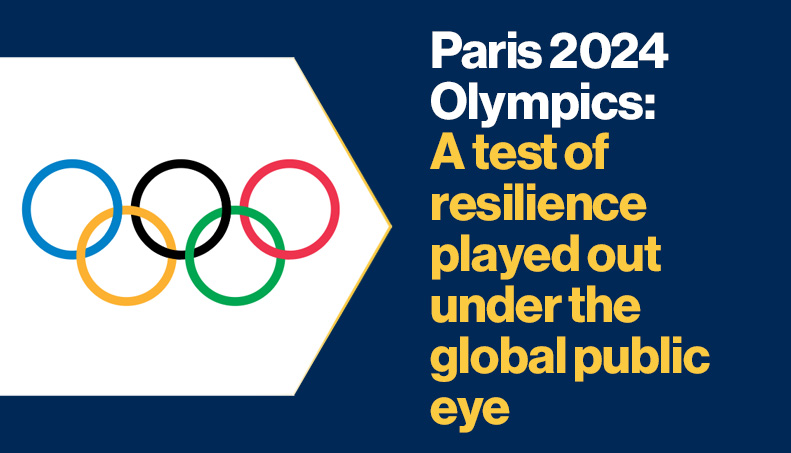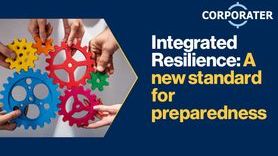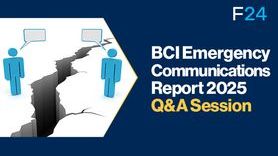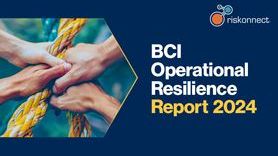Paris 2024 Olympic Games: A test of resilience played out under the global public eye

2024’s Paris Olympics Games opened on 26 July and closed on 11 August. During this time, global attention was fixed not only on the performance of its athletes, but also on its management.
A global event such as the Olympic Games has the potential for numerous major disruptions. Indeed, early on opening day, saboteurs struck the train network with a series of co-ordinated arson attacks that caused havoc to those travelling to the Games. Although most trains resumed normal operating times by the following day, the disruption drew criticisms about security gaps and the safety of the Games. The Olympics are far from alone in being hit by problems with infrastructure: the BCI Horizon Scan Report 2023 revealed critical infrastructure failure as the second most disruptive event over the preceding 12 months for organizations, and this attack on France’s transport systems underlines it as still a very current threat capable of causing widespread disruption.
The viability of the River Seine to host swimming races was another criticism levelled at organisers. A reported 1.4 billion euros was spent ensuring the water met official standards after its century-long swimming ban but despite this, some training sessions were cancelled and races were postponed, due to high levels of bacteria, which led to criticisms that back up plans were lacking and races should have taken place in a reserve location. The Olympic Village too has attracted its share of complaints. Built in part to help alleviate the Parisian housing crisis, issues such as the lack of usable air conditioning in a heatwave have added to existing ethical concerns surrounding the repurposing of industrial warehousing, which reportedly displaced vulnerable migrants and squatters.
The Seine’s clean-up, and new low-cost housing created by the Olympic Village, are meant to outlast the sporting events and create a legacy to boost the City of Paris’ reputation, but criticisms viewed by its global audience may have caused reputational damage. BCI research[1] indicates that this is an area of growing concern, with 9.5% of survey respondents experiencing a business ethics incident in the past year, and 57.6% encountering impacts in the form of reputational damage. This highlights a growing need for consideration of ethics due to their damaging potential to brands and products, something which is already being played out in supply chain management with the emphasis placed on ethical supply chains. A pre-curated cohesive PR response is necessary to respond to disrupted events in the public eye, something that was lacking following sickness reports among the swimming athletes. Although the Paris organisers responded to suggested reports of sickness caused by contaminated river water, the World Aquatics body simply deferred to the Paris organisers’ comments, potentially giving the impression that they were not aware, or interested, in the issues.
However, despite these challenges, one of the major risks, that of a disruptive cyber security breach, appeared not to materialise. Vincent Strubel, director general of ANSSI, France’s national cybersecurity agency, said:
“The Games are facing an unprecedented level of threat, but we've also done an unprecedented amount of preparation work, so I think we're a step ahead of the attackers.”[2]
Cyber security experts suggest that the high volume of people and interconnected data in the time-pressured environment created by the Games is a perfect storm for attack vectors. Indeed, 2021’s Tokyo Games suffered a reported 450 million cyber-attacks[3] and the Paris Games were expected to receive eight times more. Rising cyber-attacks are outlined in BCI research[4] as a top concern for practitioners, driven by management concern, with three-quarters of organizations experiencing an increase in attacks in the year to March 2024. However, despite this increasing threat, there is no evidence of severe cyber-attacks affecting the Games, something organizers should rightly feel proud of.
Another success story is the physical integrity of the Games. Tens of thousands of police officers and military personnel have guarded Olympic venues, tourist attractions, and the streets to prevent disorder, not least during the ambitious opening ceremony that used miles of the River Seine instead of a traditional stadium. The physical presence of the police and military not only served as a deterrent to potential criminals, but also provided visitors with confidence that they would be safe. Routes around venues were also managed with precision, with visitors channelled down selected, guarded streets with surrounding roads closed off. Metro stations were also closed around venue hubs, reducing the risk of an incident occurring on public transport and pushing visitors above ground where they could be more easily monitored. Critical national infrastructures such as water and power supplies too, have not buckled under the strain.
Key takeaways that business continuity practitioners can note from these success stories include auditing an organization’s reliance on critical infrastructure such as transport networks, strengthening their cyber resilience to address the rising threat of cyber-crime, and focusing on reputational damage to their brand from ethical and environmental considerations by pre-curating a cohesive PR response to potential incidents.
Despite some issues, which are to be expected in an undertaking of such magnitude, the majority of commentators have widely hailed the Games as a success story. On the whole, Paris 2024 proved well organised and resilient, and emerged relatively unscathed from a global event that is challenged by numerous risks and played out in the public eye. Indeed, a reported record-breaking 9.7 million tickets sold this time, a marker of the Games’ continuing popularity and success stories coming out of it. However, organisers won’t be able to breathe a sigh of relief until the summer Paralympic games have concluded on 8 September.








































